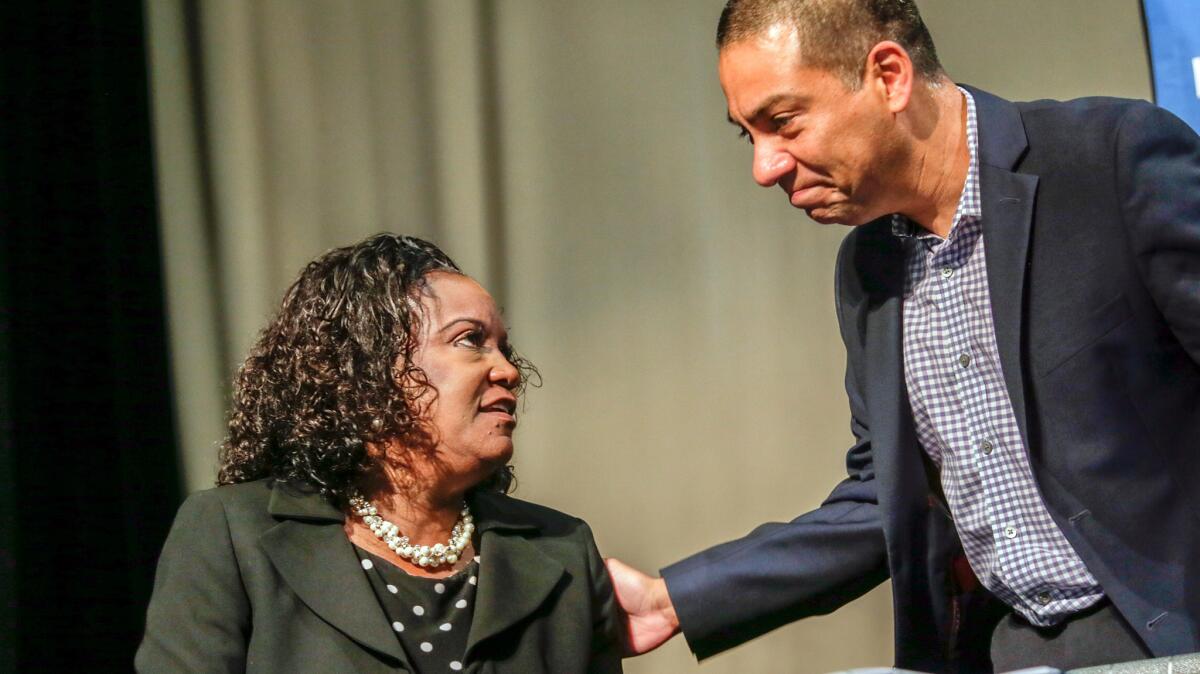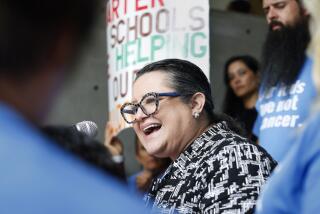How the relationship between L.A. Unified and charter schools is ‘like a middle school dance’

For years, parents in the nation’s second largest school district have faced disarray when trying to find the best place for their kids to learn.
There are about 10 types of public schools in the Los Angeles Unified School District, many with their own admissions processes and schedules.
To address that problem, the school district has discussed creating a “unified enrollment system,” a one-stop-shopping experience for choosing between district schools.
Initially, the plan only included district schools and not independent charters — the publicly funded but privately run alternatives that are often accused of draining money and enrollment from L.A. Unified.
But as the district tries — in the words of its superintendent Michelle King — to “change the narrative” about the rivalry, that might change. After a forum designed to help charter and district school teachers learn from each other on Saturday, King signaled she is open to the idea of including charters on the enrollment menu.
“It’s part of the conversation in terms of them [charters] wanting to be included, maybe we start off with a pilot, maybe a few,” King said in an interview Saturday. “We’re open to the possibility.”
But would charter schools participate?
Yvette King-Berg, the executive director of Youth Policy Institute Charter Schools, a network of three independent charters in Los Angeles, said she would need more details about how the unified system would work before signing her schools up.
Charter schools with more applicants than available spots must have a lottery — King-Berg, who attended Saturday’s summit held at the Sonia Sotomayor Learning Academies campus in Glassell Park, isn’t sure how that would work in a unified enrollment system.
Cristina de Jesus, the chief executive of Green Dot Public Schools California, a network of 18 charter schools in the L.A. area, agreed. “We just need a little bit more information” about the enrollment system, she said.
King said she has not spoken to any charter school leaders about including them in the system. There’s currently no timeline for its launch.
“It’s a bit like a middle school dance right now,” said Jason Mandell, spokesman for the California Charter Schools Association. “Each side seems to be waiting for the other to take the first step and ask the other one to dance. If the district is interested in inviting charters to be part of the unified enrollment process, the charter community is definitely interested in having those discussions.”
It’s too early to know if all charter schools would want to be involved, Mandell said.
And despite the spirit of unity the event on Saturday tried to promote and which charter leaders said they appreciated, there is an unchanging reality.
“There isn’t enough enrollment to go around,” Ref Rodriguez, a school board member and charter school founder, said during Saturday’s panel with King. “We’ve got to sort of come to terms with that.”
Beyond the issue of declining enrollment in L.A. schools, which is also a result of demographic shifts in the area — there are fewer young people than there were a decade ago — some district leaders still have problems with charter schools.
LAUSD Board President Steve Zimmer spoke at the forum in support of King’s call to “change the narrative” of negative relationships between charters and district schools, noting that “the devastating effects of poverty and racial and economic segregation affect kids in LAUSD schools and they affect kids and families in charter schools.”
But during a June board meeting, Zimmer called Proposition 39, the law that allows charter schools to take space on district school campuses, “a bad law,” and admonished the charter schools association for suing the district. At the same meeting, board member George McKenna resisted creating a committee to improve colocation practices between charters and district schools: “I do not believe it is our job to make it comfortable for charter schools to co-exist with us,” he said.
Reach Sonali Kohli at Sonali.Kohli@latimes.com or on Twitter @Sonali_Kohli.
More to Read
Start your day right
Sign up for Essential California for news, features and recommendations from the L.A. Times and beyond in your inbox six days a week.
You may occasionally receive promotional content from the Los Angeles Times.







